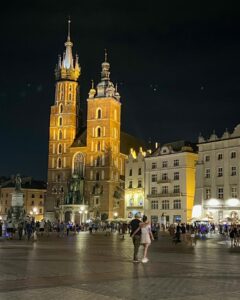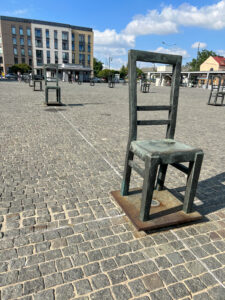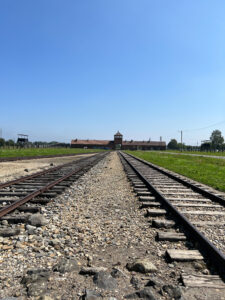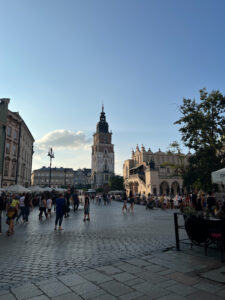
It didn’t make logical sense to go to Krakow. Michael was meeting me just two days later in Budapest, and I was conveniently a two-hour train ride from there. The route to Krakow was particularly inconvenient and out of the way. Logically I could have spent an extra day in Bratislava or a couple nights in Vienna. I could have gone to Budapest early and been there waiting for him. But I couldn’t help it—it felt imperative that I see Krakow, or more specifically, it felt imperative that I tour Auschwitz.
There was railway work on the line between Austria and Poland somewhere, and it was supposed to take me three different trains to reach Krakow. I didn’t mind. My Eurail pass meant the tickets were free, and all I had to pay was a cheap reservation fee. But when my first train was unexpectedly rerouted, it meant I missed the next two connections. I wouldn’t be able to get to Krakow by train until the next day. I was just half an hour into the trip—I could have turned around easily. Instead, I did some fast googling, got off the train at the first city we came to in the Czech Republic, and somehow miraculously purchased a (too expensive) ticket for the last seat on a bus heading to Krakow an hour later. Which of course ended up being delayed. At that point, just getting on a bus heading in the right direction felt like a victory though. Finally, after 17 hours of travel, I made it to the hostel near midnight. And I still stand by the decision to get there, however I had to do it.

Only two days in Krakow meant I had one day for the city and one day to tour Auschwitz, which is about an hour and a half away. I crammed in as much as I could. Krakow surprised me. The history that I associated with the city was the WWII history, but the city had a long and fascinating history way before the war. The Main Square in Krakow is the largest medieval town square in Europe. It’s huge and completely full of dozens and dozens of shops and restaurants and crafts and vendors. There’s a castle in the center of town that legend says used to have a dragon (so of course I came away with a dragon magnet). The city never seems to get tired. You could stay out all night and never get bored (as evidenced by the guys in my hostel room who stumbled in at like 5am after what I assume was a festive time). I stumbled upon a pierogi festival and tried Bolognese, curry, and Nutella pierogies.
And alongside this vibrant and youthful energy, there’s enough WWII history here that you could spend two weeks just learning about it. It’s almost hard to make sense of this being the same place as the one I’ve read dozens of Holocaust books about, but something I’ve seen a lot of on this trip is what resiliency looks like and what cities are capable of creating for themselves in the aftermath of tragedy. Krakow was the first example I saw of that.

I visited the Schindler Factory, which is now a museum about the Jewish history of Krakow during WWII. I learned a lot that I hadn’t known before, like how Schindler was a bit of a controversial figure in Krakow and how we see him as a hero today simply because Spielberg made the movie and depicted him in that light. I learned about other people I hadn’t known about before, like the pharmacist Tadeusz Pankiewicz who was Catholic but stayed in his pharmacy in the Jewish ghetto even though the gestapo told him to leave. He provided medicine to the Jewish people, often free of charge, but he also provided things like hair dye for disguises and tranquilizers to keep frightened children quiet when families were hiding during gestapo raids. You can still see his pharmacy today, too.
And then the next day, I went to see Auschwitz. I’ve had a hard time describing the experience. I don’t know the appropriate adjective to use (“It was incredible” really doesn’t have the right connotation.). I think the Holocaust is something we’ve seen so frequently in movies and books that we’ve become a bit desensitized to it—or at least this is true for me. Not that it seems any less horrifying, but more that the visceral shock and horror of it wears off. This is just a fact that we know now instead of a fact that feels incomprehensible. Getting to see it was a very different thing.

It’s amazing how much is preserved at Auschwitz I. They opened it as a museum only TWO YEARS after WWII ended, and many Auschwitz survivors came back to help restore it and be tour guides because they didn’t want what happened there to ever be forgotten. Auschwitz II-Birkenau was mostly destroyed by the Nazis to erase their crimes, but even the ruins they left behind have been preserved largely the way they left them.
I took a lot of pictures, but everyone I spoke to on my tour agreed that we felt weird taking pictures and even weirder thinking about what to do with them. There’s a tricky line between honoring a place and sensationalizing it. I liked that there were areas at the camp where photos weren’t allowed (like the massive room with the hair cut from the women killed in the chambers). I won’t share any photos of things like the gas chamber or the crematorium or the massive collections of belongings people brought with them because they thought they were just being “resettled” with their families. It would feel disrespectful and strange to publicly share those.

One of the men on the tour with me was from Texas but was visiting Poland while on a break from volunteering in Ukraine. Seeing this history alongside him felt surreal. How could atrocities like this have happened so recently, I kept thinking. But then I’d realize I was standing next to my Texas pal, and I’d reframe the thought to, “Wait, how could atrocities like this be happening NOW? And just a few hours from here?”
It’s easier than you think to snap out of it. You head back to Krakow and get a delicious stew for dinner and fig sorbet for dessert while you wander the craft booths in the square. I did these things, but the whole time I kept reminding myself about all that I didn’t want to forget. Not that it would ever be possible to forget, but more that it would be possible to set it aside and focus only on the happy parts of your vacation. But I didn’t want to do things to bury the feeling. I wanted it to stay fresh. I’m writing this nearly two months later, and I’m still thinking about all that we can’t let ourselves forget.

I encourage everyone who has the opportunity to see Auschwitz to see it. Because even though this may seem like history that couldn’t happen today, it’s not. This was so recent that people who survived it can still tell you today that they would never have imagined this could happen in their lifetime, either. Until it did. The last few years have made me feel certain that this could absolutely, without question, happen again. It’s so important to remember this history so that we can do everything in our power not to let it.

